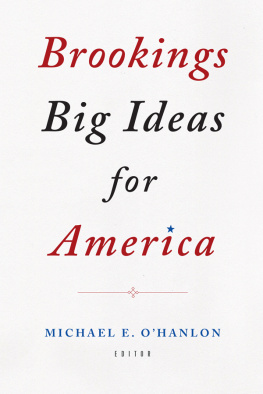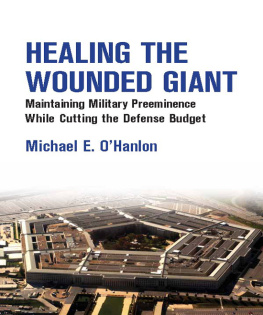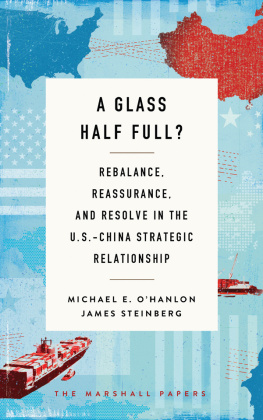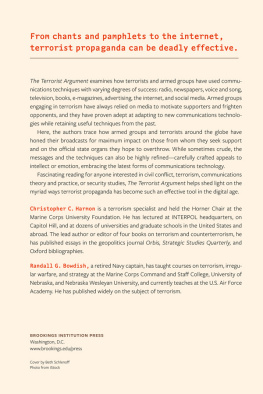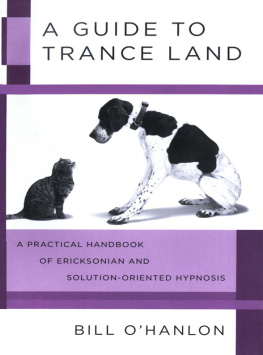Michael E. OHanlon - Brookings Big Ideas for America
Here you can read online Michael E. OHanlon - Brookings Big Ideas for America full text of the book (entire story) in english for free. Download pdf and epub, get meaning, cover and reviews about this ebook. year: 2017, publisher: Brookings Institution Press, genre: Politics. Description of the work, (preface) as well as reviews are available. Best literature library LitArk.com created for fans of good reading and offers a wide selection of genres:
Romance novel
Science fiction
Adventure
Detective
Science
History
Home and family
Prose
Art
Politics
Computer
Non-fiction
Religion
Business
Children
Humor
Choose a favorite category and find really read worthwhile books. Enjoy immersion in the world of imagination, feel the emotions of the characters or learn something new for yourself, make an fascinating discovery.
- Book:Brookings Big Ideas for America
- Author:
- Publisher:Brookings Institution Press
- Genre:
- Year:2017
- Rating:5 / 5
- Favourites:Add to favourites
- Your mark:
- 100
- 1
- 2
- 3
- 4
- 5
Brookings Big Ideas for America: summary, description and annotation
We offer to read an annotation, description, summary or preface (depends on what the author of the book "Brookings Big Ideas for America" wrote himself). If you haven't found the necessary information about the book — write in the comments, we will try to find it.
Brookings Big Ideas for America — read online for free the complete book (whole text) full work
Below is the text of the book, divided by pages. System saving the place of the last page read, allows you to conveniently read the book "Brookings Big Ideas for America" online for free, without having to search again every time where you left off. Put a bookmark, and you can go to the page where you finished reading at any time.
Font size:
Interval:
Bookmark:
- Dont obsess too much about the deficit and the debt. The United States has not been a great steward of fiscal policy in recent decades, allowing publicly held debt to rise to 75 percent of GDP. In one sense, this is not good, of course, and leaves us vulnerable to future fiscal shocks or higher interest rates. But as essays by Doug Elmendorf and others argue, given todays low interest rates, perhaps an even higher priority than driving down the debt is to invest in the future, while reorienting expenditures. We should spend more on infrastructure and education, while protecting benefits for the working poor and low-income children and elderly. We can pay for this by steps such as reducing or taxing the Social Security benefits of higher-income Americans, who have tended to benefit from the very trends in automation and globalization that have worsened the prospects of many other American citizens.
- Simplify tax policy. Whether we use reforms to drive down tax rates, drive down the deficit, or both, some steps make good sense, as Bill Gale and others argue. For example, capping deductions at a certain percent of total income while also raising the earned-income tax credit would tend to help the poor and middle classes without unduly punishing the wealthyand without attempting a wholesale revision of the tax code that would probably bog down in partisan gridlock.
- Fix (and possibly rename) Obamacare, largely through the states. The Affordable Care Act, or Obamacare, has been a partial success, but only partial, as Alice Rivlin and Bob Reischauer acknowledge. While it presents far too partisan an issue to expect easy resolution, or to allow much likelihood of a major fix like creation of a public option, there are natural paths forward for partial reform. Perhaps the central one is to encourage more states to opt out of Obamacare (or its successor), as existing law allows, provided that they devise health care reforms of their own that would achieve similar standards of coverage and (relative) affordability. Some other ideas such as facilitating the import of cheaper pharmaceuticals could help too.
Font size:
Interval:
Bookmark:
Similar books «Brookings Big Ideas for America»
Look at similar books to Brookings Big Ideas for America. We have selected literature similar in name and meaning in the hope of providing readers with more options to find new, interesting, not yet read works.
Discussion, reviews of the book Brookings Big Ideas for America and just readers' own opinions. Leave your comments, write what you think about the work, its meaning or the main characters. Specify what exactly you liked and what you didn't like, and why you think so.

